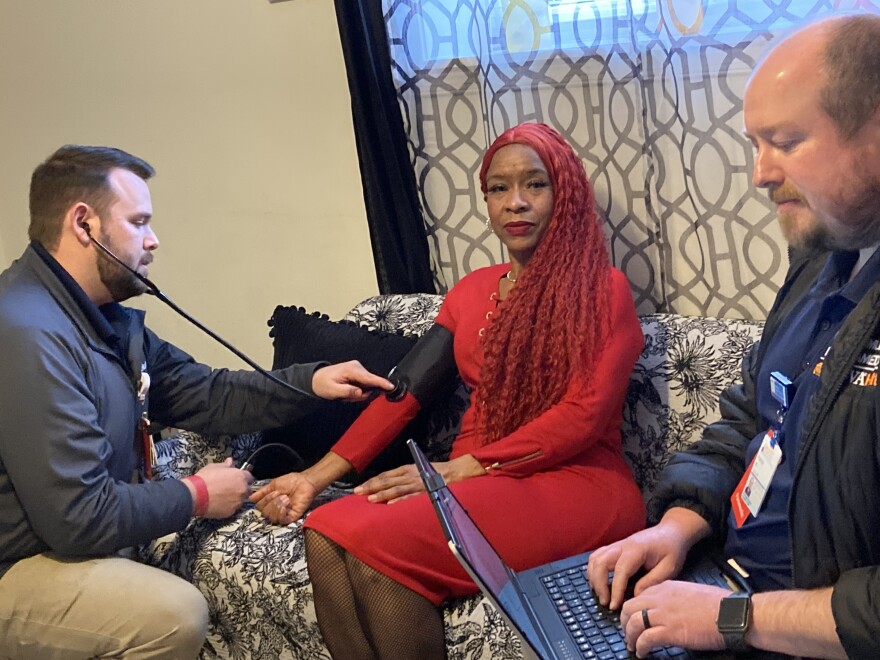At 11 a.m. on a Tuesday, Patrick Watson and Taylor Tereskerz are visiting a patient who has been to UVA’s emergency room at least once a month for the past year.
50-year-old Crystal Waller has diabetes – a condition that puts her at increased risk for heart attack or stroke – so when she first had pain in one of her arms, she wanted to get it checked.
“I really enjoy spending time with my grandkids and family, and so I would much rather be doing that than sitting in the emergency room,” she says.
Doctors found her cholesterol and blood pressure were high, and they prescribed medication to bring those readings down, but Waller kept coming back each time she felt some pain. To help her maintain a healthy lifestyle and to give her greater peace of mind, the community paramedic team now sees her regularly at home.
“Physically everything feels good – no dizziness or headaches?" Tereskerz asks as he checks her blood pressure.
" I think I had a little bit of a headache yesterday. I’ve been trying to drink enough fluids," she replies.
The paramedics travel with a basic medical kit – devices to check blood pressure, blood oxygen and glucose, ears, nose and throat, and they’ve got a decent first aid kit along with some hi-tech medical tools.
“A digital stethoscope that will record the breath sounds and upload those to a portal to where we can share those with the patient’s doctor and also run an EKG strip to where we can detect if there are any life-threatening arrhythmias.” Watson says.
They spend a lot of time educating their patients about the need to take medications as directed and adhere to special diets. By visiting their homes, they sometimes discover problems not evident in a phone call or virtual visit. Watson, for example, recalls one patient with heart disease who thought he was doing just what the doctor ordered.
“Everything looks great. He’s doing the right things. He’s eating fish daily. He’s still having these blood pressure and cholesterol issues, and then we go into his home, and we see that he is eating fish daily, but it is not salmon. It’s fish sticks.”
He and Tereskerz are usually caring for 25-30 patients at any given time – people who have been to the emergency room at least four times in the last 60 days and those with a diagnosis that might need more time and explanation than ER doctors and nurses can spare.
“They’re there to make sure that you’re not having a life-threatening emergency and once they do that, they discharge you and make room for the next person," Tereskerz explains. "There are really sick people coming in, and if that continues, the helicopter pad gets busy and a lot of traumas and stuff like that are coming in, they’re going to be waiting quite a while.”
The service has caught on, with local doctors, social workers and emergency medical technicians referring some of their patients to UVA, and the university might like to expand its community paramedicine program, but Watson says there’s one problem.
“EMS can only bill right now if we put a patient in an ambulance and transport them to a hospital, and so the program has no way to recover any money.”
They hope the federal government will soon create a billing code for services of this kind. In the meantime, they’re content to free up resources for people with true emergencies, and they’re making patients like Crystal Waller very happy.
“Taylor and Patrick, they’re awesome. I’m always happy to see them, and it’s a great program!”
This report, provided by Virginia Public Radio, was made possible with support from the Virginia Education Association.


